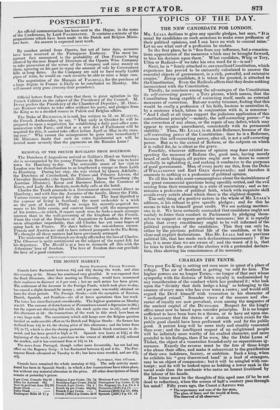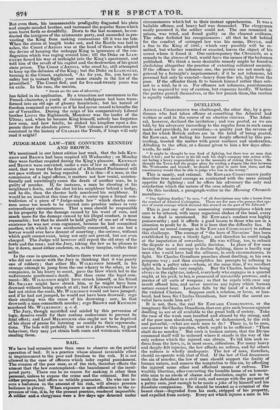CHARLES THE TENTH.
This poor Ex-King is setting out once more in quest of a place of refucie. The air of Scotland is getting 'oo cold for him. The higher powers are no longer Tories,—no longer of that sect whose sympathy with the distress of fallen royalty is undiminished by any consideration of the conduct which has produced it ; who look upon the " divinity that doth hedge a king" as belonging to the essence of every man who has ever worn a crown • and would still regard the Devil himself with veneration in his character of ".archangel ruined." Sounder views of the essence and cha- racter of royalty are now prevalent, even among the magnates of the ancient capital of the DUNDASES. Respect for the kingly office must now be based upon sounder principles. It is no longer sufficient to have been born to a throne, or to have sat upon one. It is necessary that the duties of a station which exists for the public good should have been performed with zeal for the public good. A patriot king will be more truly and steadily venerated than ever; and the intelligent respect of an enlightened people will be infinitely more worthy of his exalted character, and more grateful to his feelings, than if he were, like the Dalai Lama of Thibet, the object of -a veneration founded only on superstitious ig- norance. Exactly the reverse must be the fate of those kings who abuse their office, and make it subservient to the 'gratification, of their own indolence, luxury, or ambition. Such a king, when he exhibits his " grey discrowned head" in a land of strangers,. may be an object of compassion ; but it will be mingled with con- tempt; and he will be looked upon as holding a lower rank in the social scale than the mechanic who earns an honest livelihood by the labour of his hands.
How bitter must be the thoughts of this aged man (if he be not. dead to reflection), when the scenes of half a century pass through: his mind! Fifty years ago, the Count DARTOIS was
" The expectancy and rose of the fair state,
. The glass of fancy and the mould of form, The observed of all observers."
But even then, his immeasurable prodigality disgusted his plain and simple-minded brother, and increased the popular flame which soon burst forth so dreadfully. Down to the last moment, he con- ducted the intrigues of the aristocratic party, and succeeded in pre- venting the King from making concessions till it was too late. When the storm at length broke out, and the Bastile was laid in ashes, the Count D'ARTOIS was at the head of those who adopted the device of keeping the unhappy King in ignorance of the con- flagration which was raging around him; till the Duke DE LIAN- COURT forced his way at midnight into the King's apartment, and told him of the revolt of his capital and the destruction of his great state prison. The Count D'ARTOIS, who stood by, still attempted to keep up the delusion of the King; but the Duke DE LIANCOURT, turning M the Count, explained, "As for you, Sir, you have no safety but in instant flight; your name stands in the list of the proscribed." The Count fled; and for five-and-twenty years was an exile. In his case, the maxim,
" Sweet are the uses of adversity," has failed in its application. By a transition not uncommon in the French character, a youth of vicious indulgence had been trans- formed into an old age of gloomy fanaticism; but his hatred of freedom remained as entire as if he had never ceased to breathe the air of Versailles. During the reign of his comparatively Liberal brother Louis the Eighteenth, Monsieur was the leader of the Ultras; and, when he became King himself, nobody has forgotten how soon, and how fatally, he staked his kingdom upon a des- perate throw for absolute power. What volumes of instruction are contained in the history of CHARLES the Tenth, if kings will only read it aright!



























 Previous page
Previous page